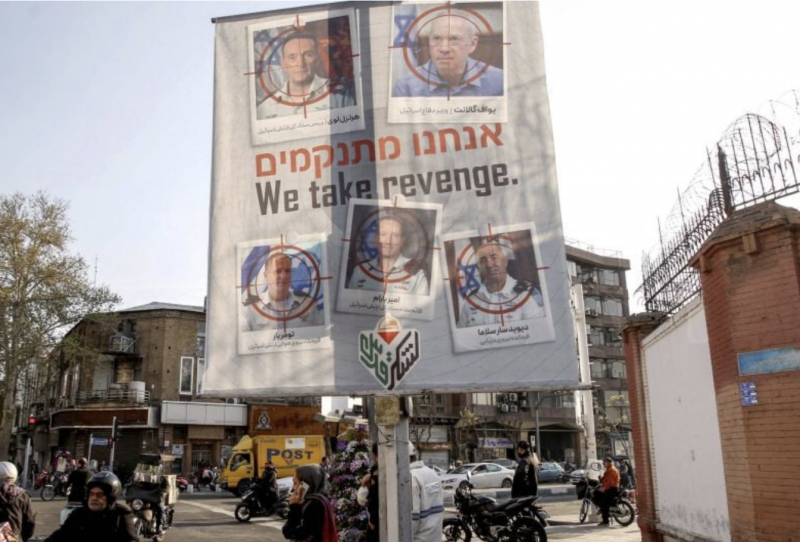
A banner displaying photos of Israeli army officials, their faces encircled by a red crosshairs icon, accompanied by the message "We will take revenge," was hung in Tehran on April 2, 2024, the day after an Israeli strike against the Iranian consulate in Damascus. (Credit: Atta Kenare/ AFP)
The prestige of the Iranian regime was struck in the heart. The Israeli attack Monday on the Iranian consulate building in Damascus was as serious as it was symbolic because it targeted an area under the sovereignty of Iran, not Syria. This was enough to force the Islamic Republic to respond appropriately.
However, Iran does not want this retaliation to serve as a casus belli for the Israelis. Is the answer to this dilemma found in Lebanon? In the past, the Islamic Republic has “hidden” behind its regional allies to wage war at a minimum cost. If we follow this logic, Hezbollah — a key Iran-aligned movement that lost a member in the attack — is the ideal candidate to avenge such an affront.
Mohammad Reza Zahedi — one of the two senior officers of the al-Quds Force killed along with five other Pasdaran members — had a long history with Hezbollah, dating back to 1998. At the time, the young general was involved in building up Hezbollah’s military capabilities and established a bridge between Damascus and Haret Hreik neighborhood [Hezbollah’s stronghold] in Beirut’s southern suburb, which enabled Hezbollah to secure its supplies through Syria.
He was also a non-Lebanese member of Hezbollah’s Shura Council, contributing to its most important decisions. In practice, he was one of Hezbollah’s most influential figures on the ground, after the assassination of Hezbollah’s military chief Imad Mughniyeh. In the wake of the Syrian war in 2011, Tehran appointed him military commander for Lebanon and Syria.
Khamenei decided
According to corroborating sources, the meeting of Iran’s Supreme National Security Council that followed the strike was marked by a divergence of opinion on how to react. The Foreign Ministry believes that it was an Israeli attempt to push Iran towards war and that Iran must not allow itself to be drawn into this trap.
On the other hand, the Islamic Revolutionary Guard Corps (IRGC) felt that without a strong response, Iran’s image in the region would be extremely weakened. They also spoke of the frustration they felt within the “Axis of Resistance” military branches, most notably the Lebanese Hezbollah and Iraqi factions, with not responding strongly to the continuing Israeli strikes.
Iran’s Supreme Guide Ali Khamenei decided that the Iranians themselves would retaliate explicitly and strongly, but this response would not be synonymous with a declaration of war.
According to the same sources, he also asked for political and security assessments on retaliating by targeting Israeli embassies or consulates, as well as the repercussions and damage this could have in Tehran. He also requested a study on the possibility of carrying out assassination operations inside Israel to undermine Israeli authority and avenge slain officials.
In the discussions that followed the strike, some pointed out that Caliph Ali bin Abi Talib —whom the Shiites consider to be the true successor of his cousin, the Prophet Mohammad — stayed out of power for over 20 years and did not resort to escalation or war to preserve the lives of Muslims. Similarly, his son, Imam Hassan, opted for reconciliation after his father’s death to spare his people a bloodbath. His brother, Imam Hussein, chose to revolt only when he felt that Islam was in danger.
According to this reading, it is now up to the Supreme Guide, the representative of the Imams on earth according to the velayat-e faqih doctrine, to make the appropriate decisions. He does not want to go to war, believing that the time for the “great revolution” has yet to come.
‘100 percent Iranian’
The Islamic Republic is concocting its response. For Iran and Hezbollah, it’s a question of striking the right balance between retaliating violently enough without triggering a regional conflict. What is certain, according to the above-mentioned sources, is that those who will pull the trigger will be “100 percent Iranian.”
The operation will therefore not be led by Hezbollah. However, the latter will be part of the response as per the “unity of fronts” strategy. No information has been leaked on the approach that will be adopted, but the response could once again be directed at Erbil, the capital of Iraqi Kurdistan, already targeted in January and long regarded by the Iranians as a stronghold of the Israeli Mossad.
The attack on the Iranian consulate is further proof that Israel is targeting all military commanders — be they Iranian, Iraqi, or Lebanese — linked to Qassem Soleimani, who was in charge of the IRGC’s extraterritorial external operations and was killed in Baghdad in 2020. It is responding to the “unity of the fronts” principle to weaken Iran and its regional allies.
In this vein, the strikes that targeted the leaders of Hezbollah’s elite al-Radwan unit are seen as a heavy blow since it will not be easy to quickly replace these experienced commanders.
According to sources close to Iran, information from Tel Aviv indicates that the Israelis are ready for a major war. Tehran and its allies are preparing for it, but will not be the ones to cross the Rubicon. “However, the Iranians and Hezbollah have set a red line: A ground operation [in Lebanon],” said a source close to Hezbollah.
This article was originally published in L'Orient-Le Jour. Translated by Joelle El Khoury.